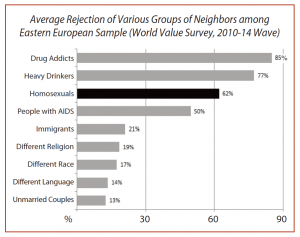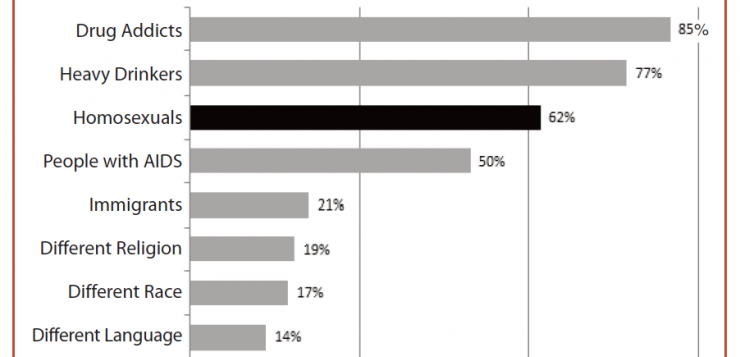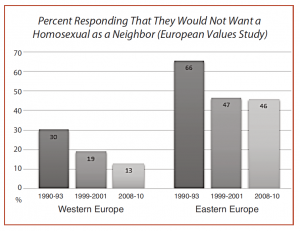IN THE LAST TWO DECADES, Western European nations have enjoyed mostly steady progress toward the acceptance of homosexuality. For their Eastern European counterparts, however, negative attitudes and intolerance toward homosexuality and homosexual people, or homonegativity,* continue to be remarkably prevalent, with some nations experiencing stagnation or even regression in acceptance in recent years. Gay rights movements have been met with repression and harsh cultural resistance. We can see this particularly in the recent violence toward LGBT persons in Chechnya, an overall rise in hate crimes across the region, and even increases in legal measures to discriminate against this minority.
In general, Western nations have done little to address the rise in the persecution of LGBT persons in Eastern Europe, though the media occasionally offer glimpses of the problem when tensions flare. For example, the West expressed disapproval when the Russian parliament passed a bill criminalizing the “promotion of non-traditional sexuality” to minors, just before the 2014 Olympics in Sochi. Global attention to the issue quickly died down, and protests achieved little. Now, in the Chechen Republic, police forces have detained and brutally tortured over a hundred men in a violent anti-gay campaign. Many have fled their homes and even the country in an attempt to escape the purge. Though Russia has pledged to investigate these offenses, President Vladimir Putin continues to deny that homosexuals face any persecution in Russia at all. Ramzan Kadyrov, the head of the Chechen Republic, responded in an interview by denying the ongoing violence, arguing that “there are no gay men in Chechnya … you can’t detain and repress people who simply don’t exist in the republic” (quoted in The Guardian, May 26, 2017).
Tracking Homonegativity
Public opinion surveys, and fluctuations of opinion over time, can provide crucial insights on this issue. For decades now, the European and World Values surveys have been asking respondents about their tolerance toward various groups. The divergence between patterns over time in Western and Eastern European nations has been striking. Below we present data for countries in the European Values Study (EVS) from 1990-2010. Among Western nations (i.e., Austria, Belgium, Denmark, Finland, France, Germany, Iceland, Ireland, Italy, Netherlands, Portugal, Spain, Sweden, Great Britain, and Northern Ireland), intolerance toward homosexual neighbors has dropped from an average of thirty percent to thirteen percent. In the East (Bulgaria, the Czech Republic, Estonia, Latvia, Lithuania, Poland, Romania, Slovakia, and Slovenia), initial large drops in homonegativity between the early and late ’90s stagnated. As of 2010, average intolerance for homosexual neighbors was as high as it had been in the previous decade, and much higher than it ever was in the Western sample.
As we discuss further below, national averages vary, but in the most recent time period of this EVS survey, only one Western nation (Portugal, at 27 percent) had greater homonegativity than an Eastern European nation (the Czech Republic, at 23 percent). Further, it is important to note that even in 2010, Bulgaria, the Czech Republic, and Estonia saw increases in the percent of people mentioning homosexuals as undesirable neighbors from the previous time period. As these older patterns make clear, the rising homonegativity and anti-homosexual violence we see occurring now has much deeper roots. To understand where more current opinion stands in Eastern Europe and post-communist nations, we focus on a subsample of six countries with data across thirty years from the World Values Survey. These patterns highlight the diversity of opinion change in these nations, but also the much greater, sustained homonegativity in each country as compared to the Western European trend.
Comparing intolerance toward homosexuals to other minorities, we find a pattern that’s quite similar to attitudes toward drug addicts and heavy drinkers, and even slightly greater than for people with AIDS. This suggests that these respondents are using a homonegative framework that identifies LGBT people as a group that is immoral, dangerous, and diseased, and may consider homosexuality to be a personal failing. In comparison, although Western Europeans also see alcohol and drug addicts as undesirable neighbors (mentioned 65 percent and 77 percent of the time in the most recent wave, respectively), no other groups are perceived with similar intolerance.†
At the Root of the Rift
As seen, homonegativity is framed quite differently in Eastern versus Western Europe. In the Western nations, having a homosexual neighbor is rarely seen as a problem. If it is, it tends to be grouped with other kinds of intolerance toward social groups that are “different” due to more-or-less stable characteristics, such as speaking a different language or practicing a different religion. In comparison, intolerance toward LGBT people in Eastern Europe is associated with perceptions of threat, failed morals, and the consequences of personal choice, as are heavy drinking, drug addiction, and AIDS infection. Thus, homonegativity in the West appears to reflect social anxiety around difference, while in the Eastern nations it is deemed to be a moral or physical danger. This conclusion reinforces other work arguing that homonegativity differs from—and is exceptionally high in comparison to—other kinds of intolerance or opinions on sexuality in Eastern Europe.
 Why do these regions diverge so strongly? Obviously, the answer is complex, but research has offered a number of important insights. Homonegativity stems in part from religiosity, economic (in)security, and uneven educational opportunities. In post-communist Eastern European states, uneven transitions to democracy and cultural inflexibility also play a role. But while we know that homosexuality has been heavily politicized, the influence of individual political perspectives is often missing in studies of homonegativity in the East. We argue for expanding academic work to include greater emphasis on broader political orientations. Without doing so, we risk underestimating the extent to which homonegativity is grounded in political ideology and propaganda. The importance of these questions escalates as Russia asserts its dominance in the region, and as Eastern European nations cope with disillusionment with democratic progress.
Why do these regions diverge so strongly? Obviously, the answer is complex, but research has offered a number of important insights. Homonegativity stems in part from religiosity, economic (in)security, and uneven educational opportunities. In post-communist Eastern European states, uneven transitions to democracy and cultural inflexibility also play a role. But while we know that homosexuality has been heavily politicized, the influence of individual political perspectives is often missing in studies of homonegativity in the East. We argue for expanding academic work to include greater emphasis on broader political orientations. Without doing so, we risk underestimating the extent to which homonegativity is grounded in political ideology and propaganda. The importance of these questions escalates as Russia asserts its dominance in the region, and as Eastern European nations cope with disillusionment with democratic progress.
In a thought-provoking argument for a more nuanced view of Vladimir Putin and Russia’s place in world order, Christopher Caldwell, senior editor of The Weekly Standard, illustrates the importance of understanding different political orientations. Alluding to an overall rejection of “Western” expectations, he quotes historian Walter Laqueur’s statement that “most Russians have come to believe that democracy is what happened in their country between 1990 and 2000, and they do not want any more of it.” If not rejecting democracy, we do see that many Eastern Europeans show a strong skepticism about what democracy means and how it may be tied to forces threatening cultural, political, and economic stability—and how the efforts of LGBT movements fit into this narrative.
While a full examination of the political correlates of homonegativity is beyond the scope of this piece, our analysis suggests the importance of continued research in this vein. Our models show, not unexpectedly, that higher levels of tolerance are associated with people who are younger, better educated, more financially secure, and less religious. However, when we also test the importance of political orientations, we find that these matter nearly as much as demographic factors. Respondents who have engaged in at least one form of political activism (e.g., signing a petition, demonstrating, or boycotting), who have lower national pride, and who reject the need to respect authority are about sixteen percent less likely to mention homosexuals as undesirable neighbors. Combining these effects reveals a large and significant gap. Of those who are the most tolerant overall, only 39 percent mention homosexuals as an undesirable minority, while the least tolerant have a 78 percent probability of being homonegative. This suggests that there are deep demographic and political cleavages in these countries that are reflected at the level of individual attitudes. The variation among residents within Eastern Europe should not be ignored, and broad claims can underestimate sources of support for LGBT rights and recognition.
With regard to variation across countries, the patterns are less apparent. Two of the least homonegative Eastern nations, Slovenia and Poland, are members of the European Union, while Romania joined the EU in 2007 and has not seen declining homonegativity in the most recent survey wave. None of the six nations differs greatly in average age or educational attainment, though Slovenia and Poland each has citizens who are on average more satisfied with their financial situation. Church attendance and nationalism also do not strongly demarcate differences among the most or least homonegative nations. Slovenia and Poland tend to have a somewhat lower emphasis on authority, and more political activism. Overall, these patterns suggest that variation within these nations must be a central area of inquiry, as these national proportions and averages clearly mask large cleavages.
Looking Ahead
The stagnation and decline of tolerance toward LGBT people in Eastern Europe should be alarming to anyone taking note of changes in Europe. It represents not only disparate perspectives on sexuality and personal identity, but also signifies a cultural and political rift between Western and Eastern Europe that may be deepening. Growing intolerance could be a symptom of a dangerous divide between East and West, rooted in political disenchantment and economic inequality. Eastern Europeans’ rejection of the West may be translating into hostility towards anything “Western,” including tolerance of sexual minorities. If this is true, then demographic and economic change alone may not be enough to push progress. Reducing homonegativity, violence, and stigma may require grassroots and locally relevant cultural frameworks that help dispel marginalizing views and foster general respect for fellow citizens.
Dissimilar political and emotional standpoints will surely prove a challenge. Even here, we need to be careful not to analyze Eastern homonegativity through a Western lens. Without open dialogue, we seem to fall into a trap in which the West accuses and the East denies. If we hope to advance understanding of these issues and to help effect relevant policy changes, we must recognize and apply the Eastern European perspective. Without this, social movements born in the West will fail to appeal to Eastern Europeans, and, in turn, Easterners may further feel misunderstood and alienated by the West.
A good next step would be to more accurately identify the roots of this intolerance. Fluctuations in homonegativity in Eastern Europe do not simply vary with religious preference, culture, education, joining the European Union, or adopting “progressive” human rights. There is something more, which we hope to explore by incorporating political orientations and ideas about activism. We plan to take a closer look at the more personal political drivers of homonegativity in an effort to piece together the growing crisis in the region, which urgently requires our attention and resolve.
* Research on opposition to homosexuality uses divergent terms and may vary by subfield. We find the term homonegativity to provide more flexibility in capturing the multidimensionality of anti-homosexual responses, as also discussed in Lottes, Ilsa L., and Eric Anthony Grollman. 2010. “Conceptualization and Assessment of Homonegativity.” International Journal of Sexual Health 22(4):219-33.
References
Caldwell, Christopher. “How to Think about Vladimir Putin.” Imprimis 46(3), 2017.
European Values Study or EVS. For more information, see www.europeanvaluesstudy.eu/
World Values Survey. See www.worldvaluessurvey.org/wvs.jsp
Catherine Bolzendahl, an associate professor of sociology at UC-Irvine, has published articles in the European Sociological Review, The British Journal of Sociology, Gender & Society, and Social Politics.
Ksenia Gracheva is pursuing a doctorate at the School of Law at UC-Irvine.
This article was adapted from a piece published on-line in Europe Now Journal (www.europenowjournal.org), July 6, 2017, published by the Council for European Studies at Columbia University.








